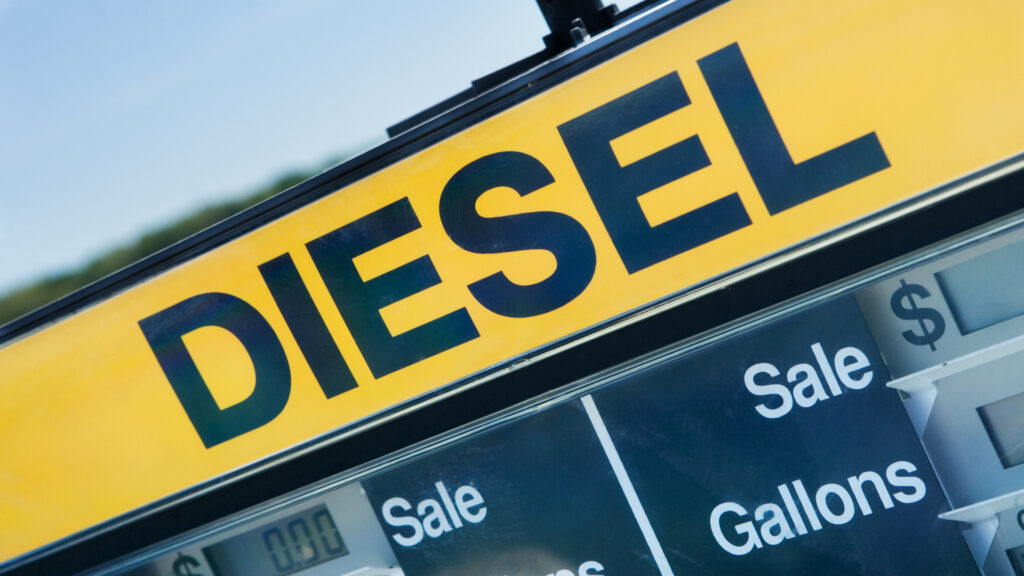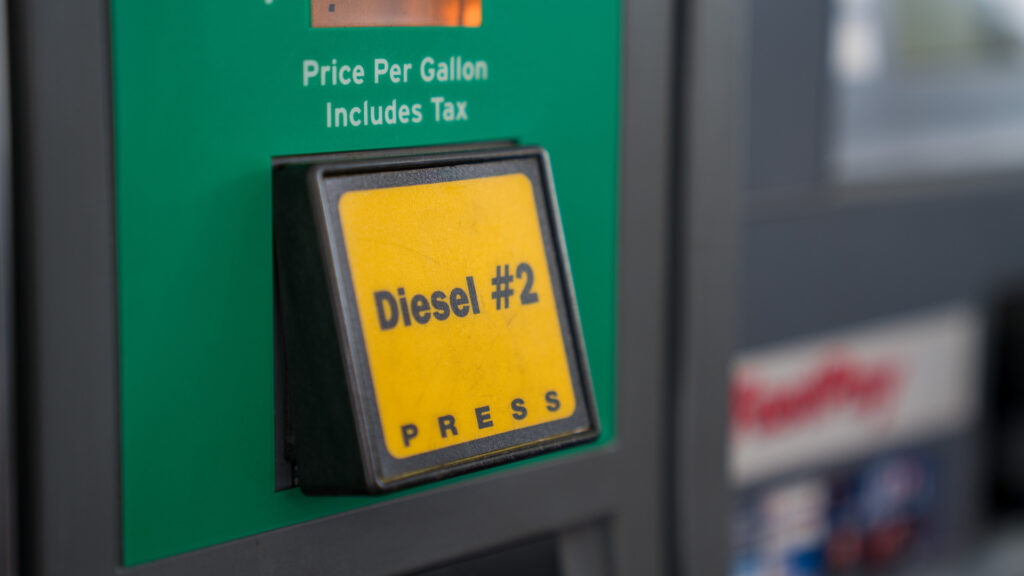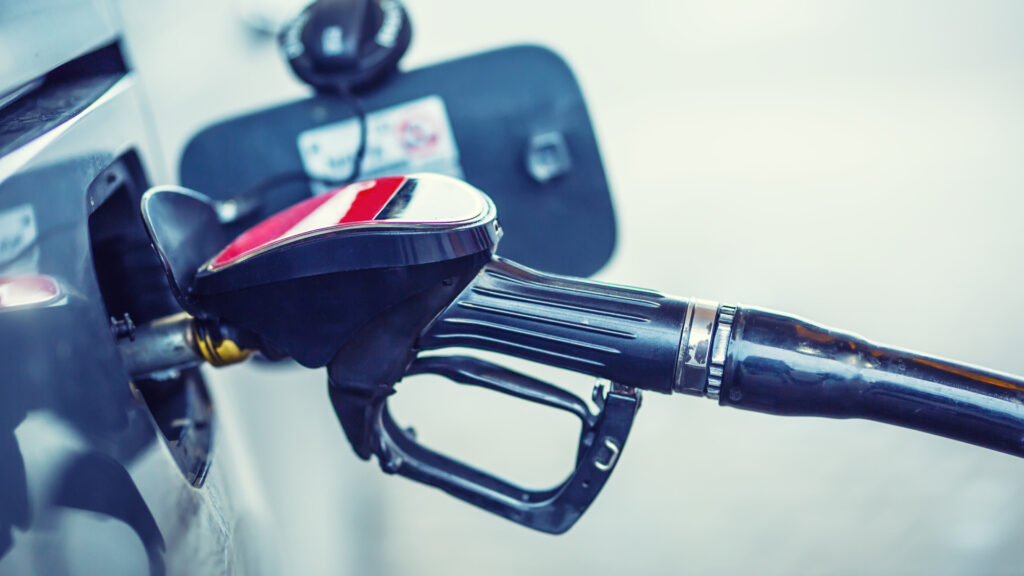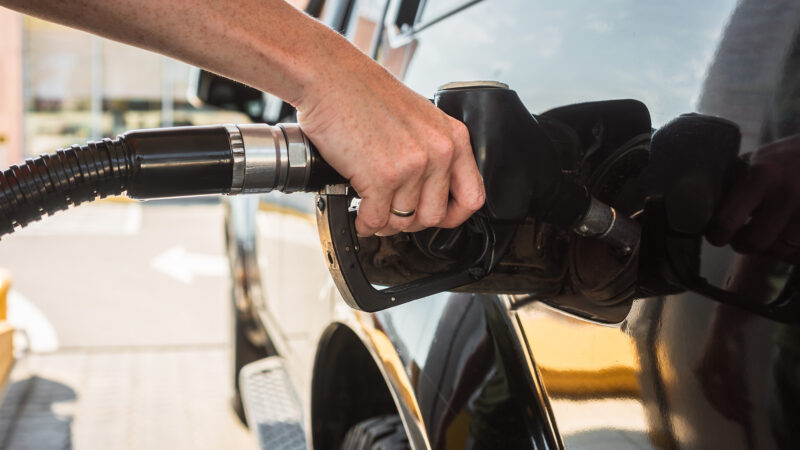Table of Contents Show
Many gas pumps remind drivers of the importance of turning off their engines while filling up their tanks. On the other hand, gasoline and diesel are two different products. Can you pump diesel while the truck is running?
If you ask around, you’ll likely get conflicting reports. Some drivers always turn off their engines, and others leave them running. So what’s the truth?
Today, we’re diving into the legal requirements and safety concerns of pumping diesel into a running truck.
Let’s get started!
What Is Diesel?
Diesel fuel is a type of liquid used in diesel internal combustion engines.
Due to its chemical structure, it is a very energy-dense liquid. This makes it highly efficient and capable of producing tremendous torque. As a result, it is great for a lot of passenger vehicles, buses, heavy machinery, and ships.
However, despite being more efficient, it has a reputation for creating harmful pollutants. The move towards drivers going green has resulted in the creation of ultra-low sulfur diesel and technologies to reduce emissions.
Despite being much cleaner than a decade or two ago, there’s still room for improvement.

How Are Gasoline and Diesel Fuel Different?
While gasoline and diesel fuel are similar, they’re also very different. Their chemical compositions are the most significant differences between the two.
Gasoline has shorter-chain molecules and a much lower flashpoint. This makes it a substantially more combustible liquid compared to diesel fuel.
The longer-chain hydrocarbons found in diesel make it denser and more full of energy. In addition, it requires compression ignition. Instead of a spark plug igniting the fuel, it relies on air compression inside cylinders, which causes it to ignite spontaneously.
Each fuel type gets tailored to the needs of the specific engines. Diesel engines are typically more efficient and durable. In addition, they create a tremendous amount of power. Alternatively, gasoline engines are cheaper, generate more power at higher RPMs, and offer more acceleration.
It’s important to remember that they’re not interchangeable. Putting diesel into a gasoline engine can clog the fuel system but won’t typically cause extensive damage. However, putting gasoline into a diesel engine can leave you stranded and cost you thousands of dollars in repairs.
Can You Pump Diesel While the Truck Is Running?
It may alarm you to see a trucker filling their massive fuel tanks while leaving their truck running. However, let us ease your worries by informing you that the flashpoint for diesel is 125°F to 180°F. This means the fuel would need to be heated up considerably before igniting.
Unfortunately, drivers of gasoline vehicles don’t have the same luxury. Gasoline’s flash point is between -40°F and -45°F. It won’t take much to cause a serious and dangerous situation. Gido van Tienhoven created a fantastic video demonstrating this principle.
While you can pump diesel while your truck runs, avoid parking next to a driver pumping gasoline. If you do, turn off your engine. While the risks are still relatively low, it is better to be safe than sorry.
Is Diesel Fuel Dangerous?
Diesel fuel is generally safe, especially if appropriately handled. You must treat diesel and any other fuels with care and caution. Spilled fuel can create a fire hazard, impact the environment, and cause health issues.
When handling fuel, wear gloves and other protective gear. Direct contact with your skin can cause irritation and other skin conditions. While diesel is less dangerous than gasoline and other more flammable liquids, you can’t ignore safety.
Other Dangers for Diesel Trucks
While pumping diesel while your truck is running may not be an issue, there are other dangers. Let’s look at some potential issues diesel truck owners often face.
Low-Quality Diesel
Pumping low-quality diesel into your fuel tank can quickly ruin that fancy truck you just bought.
You can expect performance issues, fuel filter clogs, increased emissions, and premature wear and tear on the engine and various components. Avoid low-quality diesel if you want to keep your truck in tip-top shape.
The best way to do this is to be picky about where you purchase diesel. While looks can be deceiving, you may still want to drive by a sketchy gas station.
It’s often best to fill up at fuel stations that frequently cycle through their fuel and receive regular shipments. This helps ensure the fuel is fresh and hasn’t been sitting for several months.

Water Contamination
A little water in your fuel system can have severe consequences. It can lead to corrosion in the fuel injectors, fuel pump, and fuel lines. These often result in leaks, reduced pressure, and performance issues.
If you’re not aware, water and diesel do not mix. Tiny water droplets, known as emulsions, can clog fuel filters. This will reduce fuel flow to the engine and result in misfires, rough idling, and less power.
To help avoid this, regularly put fuel additives in your fuel tank. This helps prevent water from building up and causing problems and saves you money and frustration.
Keep in Mind: Have you ever wondered what happens if you Put Diesel in a Gas Engine? You shouldn’t put diesel in a gas engine, but mistakes happen!
Gelling in Cold Weather
When diesel fuel gets cold, it crystalizes and becomes a gel-like substance. This can occur anytime the fuel gets below freezing, but it’s most common once temperatures dip below 10°F to 15°F.
The gel can clog up the fuel system, resulting in rough idling, reduced performance, and a potential breakdown.
Fuel providers in areas that regularly experience these harsh temperatures will often switch to a seasonal fuel mixture. This fuel contains additives to prevent the crystals from developing. However, it’s a good idea to use anti-gelling additives in your diesel truck just in case.
Fuel Filter Maintenance
The filters in your vehicle’s fuel system remove impurities and other gunk that get into the fuel. They’re essential as they prevent dirt, debris, and other contaminants from getting to your engine. As they clog, it can result in reduced fuel flow, misfires, and performance issues.
It’s a good idea to replace your fuel filters every 20,000 to 30,000 miles. However, you’ll want to check the manufacturer’s recommendation instead of taking our word for it. You can typically find this in the owner’s manual that came with your diesel truck or on the manufacturer’s website.

DEF System Issues
Automobiles built with diesel engines after 2010 come with a Diesel Exhaust Fluid (DEF) system. The components in these systems help reduce emissions and create greener vehicles. Unfortunately, they can experience issues and require regular attention.
These systems rely on diesel exhaust fluid. Unfortunately, some owners have put contaminated fluids in their tanks and experienced numerous issues. Sadly, these typically aren’t cheap repairs.
It’s common to hear owners having to fork over several thousand dollars in many instances. While they may help the environment, they don’t do your bank account any favors.
Keep in Mind: So What Does DEF Fluid Actually Do? Let’s take a look!
Should You Pump Diesel While Your Truck Is Running?
Whether or not you pump diesel while your truck runs is entirely up to you. If you will be standing next to your vehicle the entire time, it may be worth leaving it running.
However, we wouldn’t advise you to leave your truck running if you’re not next to it. In some areas, you could return to find an empty parking space.
Do you leave your truck running while fueling up with diesel?






